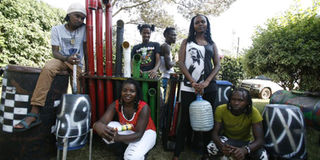How we make from trash music that is fit for queen

From left Joshua Mureithi, Ruth Juma, Patrick Njeru, Kennedy Opiyo, Monicah Nyokabi and Joel Muiruri who are all members of Slum Drummers after holding their practicing session in Waithaka in Nairobi on February 17,2015. PHOTO | EVANS HABIL | NATION MEDIA GROUP
What you need to know:
- For the years they have practised at Waithaka, they have been attracting a growing audience who marvel at their creativity.
- Originally known as Jua Kali Drummers, it took six years for them to learn the art of making and playing instruments, during which several of the members opted to set off on their own.
- Slum Drummers have also performed in Brazil, Ethiopia and at the Umbria Jazz Festival in Italy.
As he softly plucks the flexible thin strips of iron that are neatly attached to a plywood secured onto an aluminium cooking pot, a soothing Kiswahili rendition fills the air.
The instrument played by Joel Muiruri is a kalimba (thumb piano), famed among the Swahili. On Muiruri’s right, Kennedy Opiyo plays a pair of drums made from discarded pieces of metal and plastic. Soon, a sweetly harmonised Swahili tune emerges.
In one corner of their newly acquired office deep in the Waithaka slums of Dagoretti, Nairobi, lie transformed empty spray cans, sufurias, water tanks, plastic pipes and wooden rods. This bewildering array of trash has been transformed into musical instruments.
It is a busy afternoon. The group of seven is preparing for an upcoming performance.
They call themselves the Slum Drummers and they formed the group 10 years ago.
“We believe that everything has its worth and that is why we decided to make our instruments from recycled material,” says Muiruri.
For the years they have practised at Waithaka, they have been attracting a growing audience who marvel at their creativity.
Every member of the Slum Drummers is a rehabilitated, orphaned former street child. The group was founded by an Italian artist, who wanted to improve their welfare.
“We all met during a rehabilitation programme conducted by Amref’s Child in Need Project,” says Muiruri. “At that time, in 2005, Giovanni, the Italian artist, brought us together. We were among the 45 successful children who were interviewed.”
Originally known as Jua Kali Drummers, it took six years for them to learn the art of making and playing instruments, during which several of the members opted to set off on their own.
The new group settled on the name Slum Drummers.
“We were disgruntled by what we were earning after our performances. We had to change our strategy,” says Patrick Njiru, a group member.
However, the group was to lose five more members besides the 14, who had left Jua Kali Drummers.
DUMPSITES
The members traverse various dumpsites to collect whatever materials they can get. “We look for anything that can produce sound. From plastic bags and bottles to empty perfume and spray cans. To make shakers, for example, we clean up a cylindrical can, fill it with green grams and fasten its opening with wooden rods,” says Muiruri.
Sometimes they are forced to buy some of the materials, especially plastic water tanks, which cost anything from Sh2,000.
Slum Drummers entertain at private and public functions where they charge Sh150,000 for a one-hour private show and between Sh70,000 and Sh85,000 for a public performance.
The group’s most memorable moment was representing Kenya during Queen Elizabeth’s diamond jubilee celebrations at Buckingham Palace in London in 2012.
“It all started with a short video we had uploaded on Youtube. The next thing we knew was that Gary Barlow, a UK-based songwriter, was in our backyard looking for us to go to London,” Muiruri says.
“It felt like a dream.”
Slum Drummers have also performed in Brazil, Ethiopia and at the Umbria Jazz Festival in Italy.
“While we have recognition out there, back home people have yet to embrace this kind of art. We have stereotypes who believe that a street kid should not charge much,” says Ruth Juma, one of the two girls in the group.
Opiyo says: “The other challenge we face is lack of shows. January, February and June are usually dry months for us.”
During their days on the streets, they depended on the collection of waste materials for their survival. Now their 15 musical instruments, made from recycled material, depicts the courses of their lives.
Hanging on the wall is a short write-up about the group. With it stands their motto: Our Dreams by Our Drums.
Apart from Slum Drummers, other documented groups that use recycled instruments to make music include The Recycled Orchestra from Paraguay in South America and The Garbage Men Band from Florida, Unites States.




